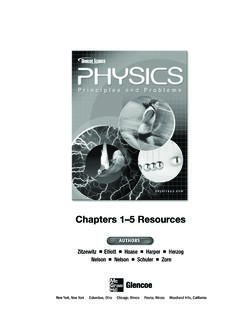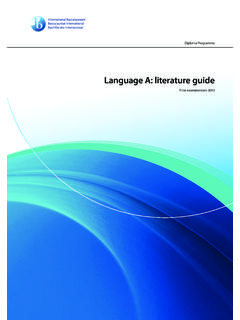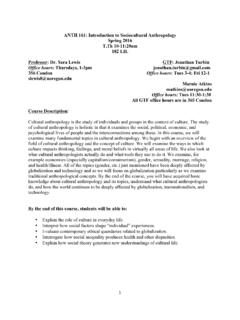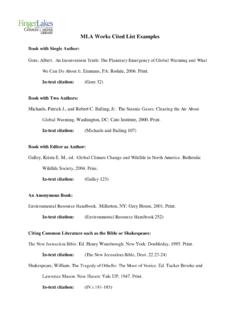Transcription of COMPLETE WORKS - cpb-us-e1.wpmucdn.com
1 PLATO COMPLETE WORKS Edited, with Introduction and Notes, by JOHN M. COOPER Associate Editor D. S. HUTCHINSON HACKETI PUBLISHING COMPANY Indianapolis/Cambridge LACHES In Greek, the subject of this dialo~ue is andreia, literally 'manliness', a per-so~a'. qualzty of wIde scope, coverlng all the sorts of unwavering, active leader-shIp In ~nd on behalf of the community that were traditionally expected in Greek Clt/eS of true men. Its special connotation of military prowess makes 'courage' a suitable, even inevitable, translation, but its broader scope should be borne In mind. Here Socrates probes the traditional conception of such cour-age as the primary quality a young man should be brought up to possess. His fellow discussants include two distinguished Athenian generals, Laches and Nicias, active in the Peloponnesian War (Nicias was captured and put to death i~ the disastrous Athenian withdrawal from Sicily in 413). The other two par-lies to the d,SCUSSIon are elderly and undistinguished sons of distinguished statesmen and generals of earlier times-Lysimachus, son of Aristides 'the lust', a famous le~der during.
2 The Persian War, and Melesias, son of Thucyd-Ide~, son of Meleslas, a princIpal early opponent of Pericles in his policy of im-perial expansIOn. Laches has an unusually full and extensive 'prologue' before Socrates lakes over the reins of the discussion and seeks and refutes first La-ches' and Ihen Nicias' ideas about Ihe nature of courage. Its function is at least In part to provide opportunities for these four representatives of the traditional concepti?n to give it some preliminary arliculation, thus bringing out some of the tensIOns and divergent ways of thinking about courage and related matters that the tradition harbors and that Socrates exploits in his own questioning later on. As always in Plato's 'Socratic' dialogues, neither general's answers to Socra-tes' queslion 'What is courage?' prove satisfactory. Much of the discussion frr cuses upon the element of knowledge-of reasoned, nuanced responsiveness to the detailed circumstances for action-that on reflection Laches and Nicias both agree is an essential.
3 Though perhaps somewhat submerged, part of the tra-dItIOnal conceptIOn to whIch they themselves are committed. It is because of thIS that N!~las .and Socrates agree (Laches is slow to accept the point, but it is clearly Implzed In what he has already said about courage's involving 'wis-dom') that no dumb animal, and not even children, can correctly be called cou-rageous-however much people may ordinarily speak lhat way. Nicias, indeed, wanls to define courage simply as a kind of wisdom-wisdom about what is to be feared and whal, on the contrary, to be buoyed up by and made hopebll as one pursues one's objectives. He intimates that this fits well with thing;he has heard Socrates sayan other occasions, and in fact toward the end of Protago-ras Socrates does adopt just this formulation of courage. Here, however, 664 Laches whether this was a genuinely 'Socratic' idea or not, he and the two generals find difficulties in it that they seem to see no immediate way to resolve, and 665 the discussion breaks off.
4 ,. LYSIMACHUS: You have seen the man fighting in annor, Nicias and Laches. 178 When Melesias and I invited you to see him with us, we neglected to give the reason why, but now we shall explain, because we think it especially right to be frank with you. Now there are some people who make fun of frankness and if anyone asks their advice, they don't say what they think, b but they make a shot at what the other man would like to hear and say something different from their own opinion. But you we considered capa-ble not only of forming a judgment but also, having formed one, of saying exactly what you think, and this is why we have taken you into our confidence about what we are going to communicate to you. Now the 179 matter about which I have been making such a long preamble is this: we have these two sons here-this one is the son of my friend Melesias here, and he is called Thucydides after his grandfather, and this one is my son, who also goes by his grandfather'S name-we call him Aristides after my father.
5 We have made up our minds to take as good care of them as we possibly can and not to behave like most parents, who, when their children start to grow up, permit them to do whatever they wish. No, we think that now is the time to make a real beginning, so far as we can. Since we b knew that both of you had sons too, we thought that you, if anyone, would have been concerned about the sort of training that would make the best men of them. And if by any chance you have not turned your attention to this kind of thing very often, let us remind you that you ought not to neglect it, and let us invite you to care for your sons along with ours. How we reached this conclusion, Nicias and Laches, you must hear, even if it means my talking a bit longer. Now you must know that Melesias and I c take our meals together, and the boys eat with us. We shall be frank with you, exactly as I said in the beginning: each of us has a great many fine things to say to the young men about his own father, things they achieved both in war and in peace in their management of the affairs both of their allies and of the city here.
6 But neither of us has a word to say about his own accompliShments. This is what shames us in front of them, and we d blame our fathers for allowing us to take things easy when we were growing up, while they were busy with other people's affairs. And we point these same things out to the young people here, saying that if they are careless of themselves and disobedient to us, they will turn out to be nobodies, but if they take pains, perhaps they may become worthy of the Translated by Rosamond Kent Sprague. 666 Laches names they bear.' Now the boys promise to be obedient, so we are looking into the question what form of instruction or practice would make them e turn out best. Somebody suggested this form of instruction to us, saying that it would be a fine thing for a young man to learn fighting in armor. And he praised this particular man whom you have just seen giving a display and proceeded to encourage us to see him. So we thought we ought to go to see the man and to take you with us, not only as fellow spectators but also as fellow counsellors and partners, if you should be 180 willing, in the care of our sons.
7 This is what we wanted to share with you. So now is the time for you to give us your advice, not only about this form of instruction-whether you think it should be learned or not-but also about any other sort of study or pursuit for a young man which you admire. Tell uS too, what part you will take in our joint enterprise. NICIAS: I, for one, Lysimachus and Melesias, applaud your plan and am ready to take part in it. And I think Laches here is ready too. b LACHES: You are quite right, Nicias. As for what Lysimachus said just now about his father and Melesias' father, I think that what he said applied very well to them and to us and to everyone engaged in public affairs, because this is pretty generally what happens to them-that they neglect their private affairs, children as well as everything else, and manage them c carelessly. So you were right on this point, Lysimachus. But I am astonished that you are inviting us to be your fellow counsellors in the education of the young men and are not inviting Socrates here!
8 In the first place, he comes from your own deme, and in the second, he is always spending his time in places where the young men engage in any study or noble pursuit of the sort you are looking for. LVSIMACHUS: What do you mean, Laches? Has our friend Socrates con-cerned himself with any things of this kind? LACHES: Certainly, Lysimachus. NICIAS: This is a point I can vouch for no less than Laches, since he only d recently recommended a man to me as music teacher for my son. The man's name is Damon, a pupil of Agathocles, and he is the most accomplished of men, not only in music, but in all the other pursuits in which you would think it worthwhile for boys of his age to spend their time. LYSIMACHUS: People at my time of life, Socrates, Nicias, and Laches, are no longer familiar with the young because our advancing years keep us e at home so much of the time. But if you, son of Sophroniscus, have any good advice to give your fellow demesman, you ought to give it.
9 And you have a duty to do so, because you are my friend through your father. He and I were always comrades and friends, and he died without our ever having had a single difference. And this present conversation reminds me of something-when the boys here are talking to each other at home, they 1. On the boys' future see Theaetetus l50e ff., where we are told that Aristides became an associate of Socrates but left his company too soon. Both Aristides and the young Thucydides are mentioned in Theages 130a ff. Laches 667 often mention Socrates and praise him highly, but I've never thought to ask if they were speaking of the son of Sophroniscus. Tell me, boys, is this 181 the Socrates you spoke of on those occasions? BoYS: Certainly, father, this is the one. LYSIMACHUS: I am delighted, Socrates, that you keep up your father'S good reputation, for he was the best of men,,.nd I am es~ially pleased at the idea that the close ties between your family and mme will be renewed.
10 LACHES: Don't under any circumstances let the man get away, Lysima-chus-because I have seen him elsewhere keeping up not only his father's b reputation but that of his country. He marched with me .in. the retreat fro?, Delium,' and I can tell you that if the rest had been Willing to behave m the same manner, our city would be safe and we would not then have suffered a disaster of that kind. LYSIMACHUS: Socrates, the praise you are receiving is certainly of a high order both because it comes from men who are to be trusted and because of th~ qualities for which they praise you. Be assured that I am delighted to hear that you are held in such esteem, and please consider me among those most kindly disposed towards you. You yourself ought to have c visited us long before and considered us your friends-that would have been the right thing to do. Well, since we have recogmzed each other, resolve now, starting today, to associate both with us and the young m~n here and to make our acquaintance, so that you may preserve the family friendship.



















![The Book of the Damned, by Charles Fort, [1919], at sacred ...](/cache/preview/c/1/4/e/b/3/b/4/thumb-c14eb3b4b6cefb47ee1be55bf987c12f.jpg)